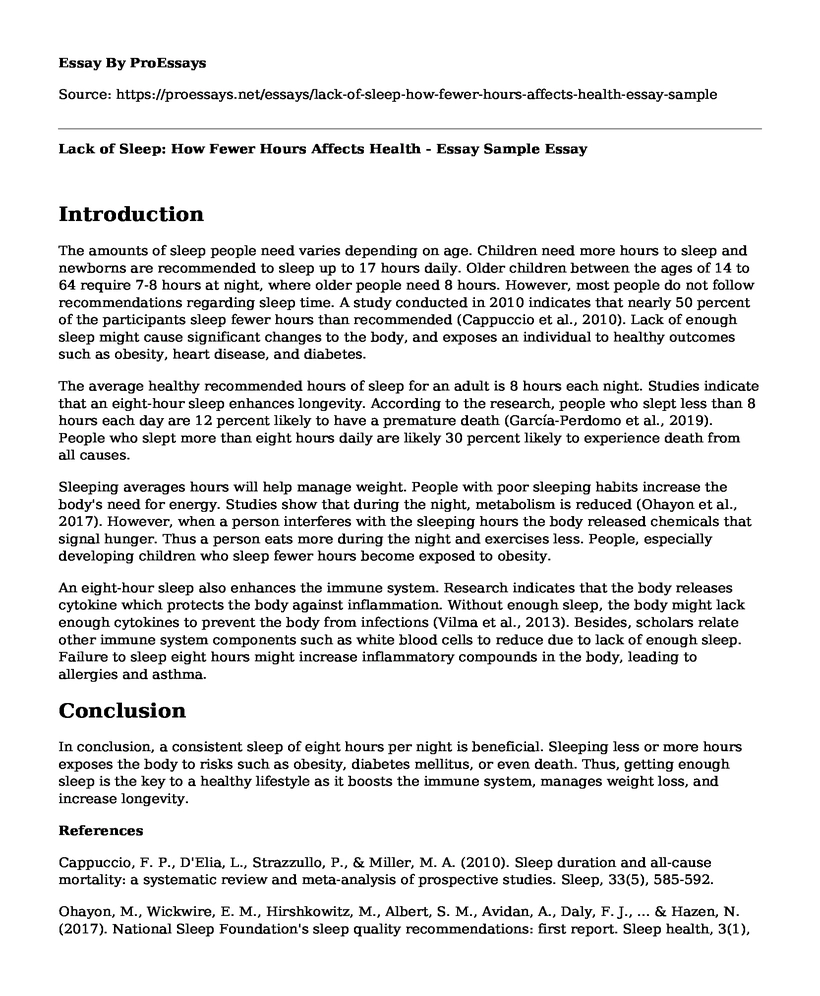Introduction
The amounts of sleep people need varies depending on age. Children need more hours to sleep and newborns are recommended to sleep up to 17 hours daily. Older children between the ages of 14 to 64 require 7-8 hours at night, where older people need 8 hours. However, most people do not follow recommendations regarding sleep time. A study conducted in 2010 indicates that nearly 50 percent of the participants sleep fewer hours than recommended (Cappuccio et al., 2010). Lack of enough sleep might cause significant changes to the body, and exposes an individual to healthy outcomes such as obesity, heart disease, and diabetes.
The average healthy recommended hours of sleep for an adult is 8 hours each night. Studies indicate that an eight-hour sleep enhances longevity. According to the research, people who slept less than 8 hours each day are 12 percent likely to have a premature death (García-Perdomo et al., 2019). People who slept more than eight hours daily are likely 30 percent likely to experience death from all causes.
Sleeping averages hours will help manage weight. People with poor sleeping habits increase the body's need for energy. Studies show that during the night, metabolism is reduced (Ohayon et al., 2017). However, when a person interferes with the sleeping hours the body released chemicals that signal hunger. Thus a person eats more during the night and exercises less. People, especially developing children who sleep fewer hours become exposed to obesity.
An eight-hour sleep also enhances the immune system. Research indicates that the body releases cytokine which protects the body against inflammation. Without enough sleep, the body might lack enough cytokines to prevent the body from infections (Vilma et al., 2013). Besides, scholars relate other immune system components such as white blood cells to reduce due to lack of enough sleep. Failure to sleep eight hours might increase inflammatory compounds in the body, leading to allergies and asthma.
Conclusion
In conclusion, a consistent sleep of eight hours per night is beneficial. Sleeping less or more hours exposes the body to risks such as obesity, diabetes mellitus, or even death. Thus, getting enough sleep is the key to a healthy lifestyle as it boosts the immune system, manages weight loss, and increase longevity.
References
Cappuccio, F. P., D'Elia, L., Strazzullo, P., & Miller, M. A. (2010). Sleep duration and all-cause mortality: a systematic review and meta-analysis of prospective studies. Sleep, 33(5), 585-592.
Ohayon, M., Wickwire, E. M., Hirshkowitz, M., Albert, S. M., Avidan, A., Daly, F. J., ... & Hazen, N. (2017). National Sleep Foundation's sleep quality recommendations: first report. Sleep health, 3(1), 6-19.
García-Perdomo, H. A., Zapata-Copete, J., & Rojas-Cerón, C. A. (2019). Sleep duration and risk of all-cause mortality: a systematic review and meta-analysis. Epidemiology and psychiatric sciences, 28(5), 578-588.
Aho, V., Ollila, H. M., Rantanen, V., Kronholm, E., Surakka, I., van Leeuwen, W. M., ... & Sallinen, M. (2013). Partial sleep restriction activates immune response-related gene expression pathways: experimental and epidemiological studies in humans. PloS one, 8(10).
Cite this page
Lack of Sleep: How Fewer Hours Affects Health - Essay Sample. (2023, Aug 25). Retrieved from https://proessays.net/essays/lack-of-sleep-how-fewer-hours-affects-health-essay-sample
If you are the original author of this essay and no longer wish to have it published on the ProEssays website, please click below to request its removal:
- And the Band Played On: Nursing Policy Development Essay
- Food Journal Analysis Paper Example
- Essay Example on End-of-Life Care: Relief for Suffering and Grief
- Essay Sample on Men's Infertility: Overlooked in Modern Society?
- Paper Example on Preventing Strokes: Anticoagulant Therapy Explained
- Paper Example on Triage Unit at St. Mary Medical Center: Delayed Diagnosis & Treatment
- Disease Model of Addiction - Free Essay Example







